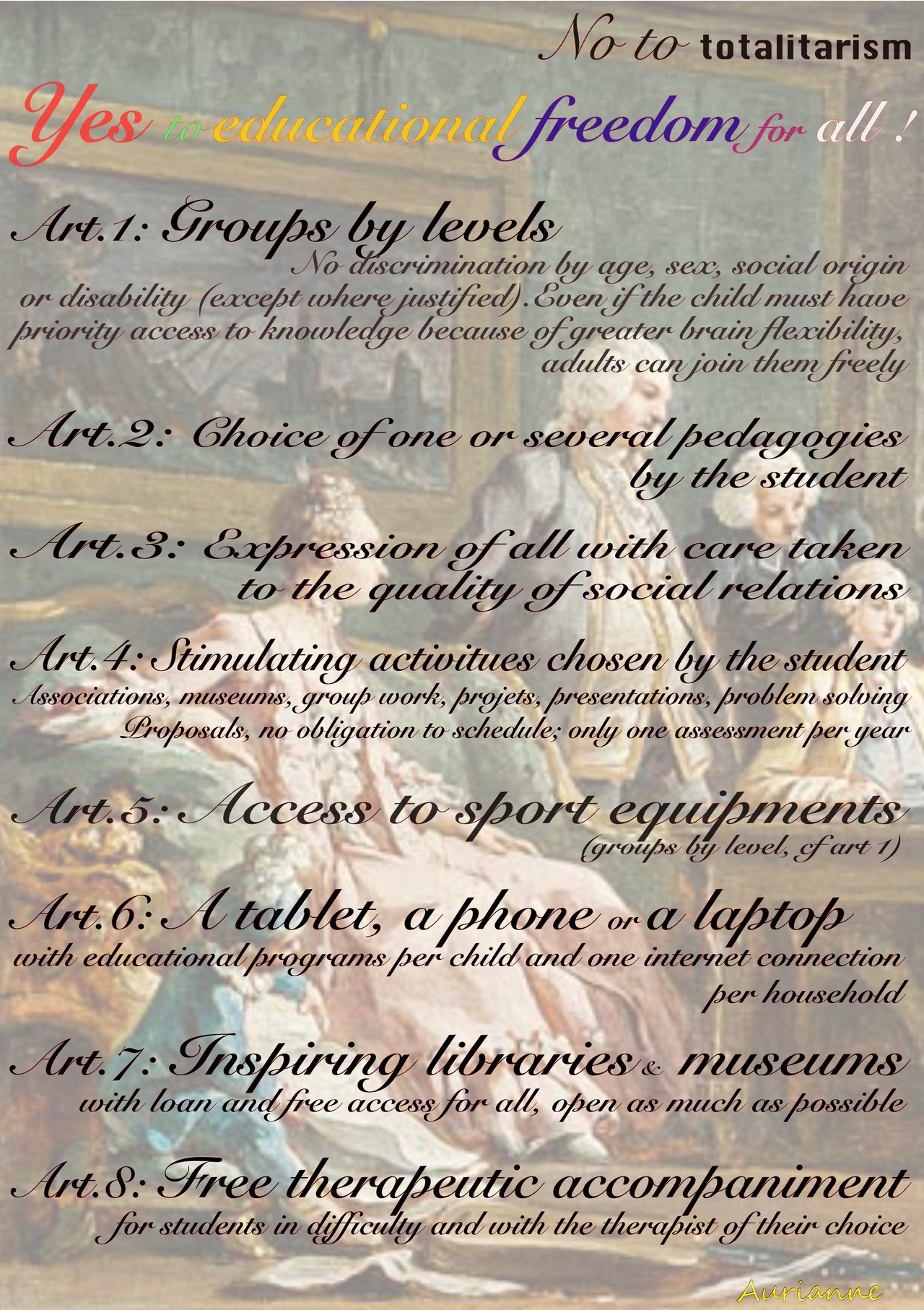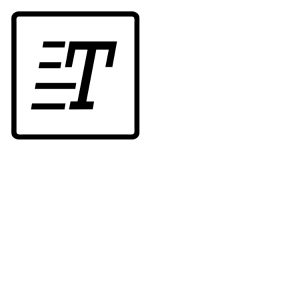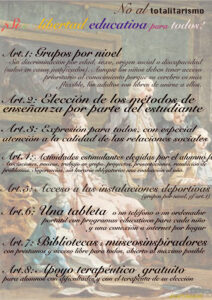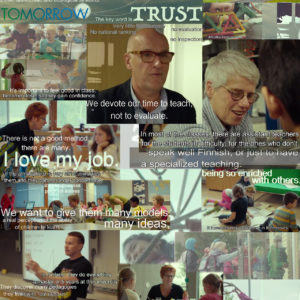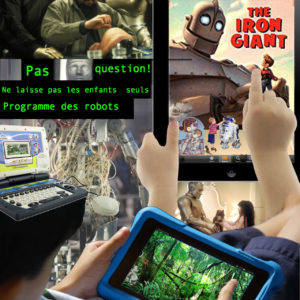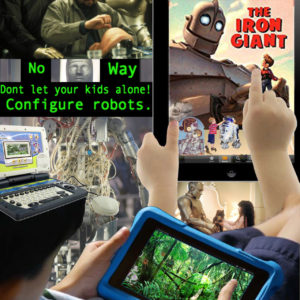The mission of national education is to educate future citizens and reduce inequalities in opportunities for success.
Recent French governments have shown no willingness to fulfill these missions. Indeed, in UNICEF’s “Innocenti 13” report, France is ranked 28th out of 35 EU/OECD countries in terms of inequality and well-being among children. (https://www.unicef.fr/article/inegalites-entre-les-enfants-la-france-28e-sur-35-pays-riches/). The demands of striking teachers have not been met. As a result, civil service competitive examinations are having difficulty finding candidates for teaching posts. The number of contract teachers, who do not have the necessary qualifications and no training in teaching (such as at the Institut Universitaire de Formation des Maîtres), has increased sharply. Teaching posts are left open to anyone willing to accept poor working conditions and little regard for student performance. Sick teachers are not replaced. There are too many pupils per class. What’s more, there’s a “numbers” policy: if the principal wants a promotion, there have to be few students in detention, and few incidents. There aren’t enough supervisors to deal with these students. To reduce their workload, they prefer to punish rather than deal with students’ problems (disabilities, complicated family situations, etc.). There are very few school nurses or social workers. Principals put pressure on teachers to keep pupils in classes, even if it means leaving out the weakest and letting the most unruly disturb the class. We shouldn’t be surprised by the number of students unable to understand or express themselves in a foreign language after 7 years of teaching, or by their inability to solve simple mathematical problems. This situation is unacceptable.
What’s more, some school principals force their teachers to follow textbooks, even if they have been trained in more effective methods. Directors and parent-teacher associations put pressure on teachers and, as a result of this pressure, teachers are stressed and irritable, which makes lessons much less effective than if these professionals had been trusted and had enjoyed doing their lessons in good spirits. Classrooms are not soundproofed, so students can’t make the noise they need to learn effectively. Computer rooms are not used because the teachers who use them have to fill in several pages assessing the computer level of each student. The administrative burden is far too heavy, so teachers are discouraged.
Teachers, pupils, parents, administration; how many are the people deeply disappointed with education? How many people lack access to education because they are too young or too old, or because they are just not fitting in the school system? How many times do we hear “I had a hard blow so suddenly I had to stop studying”?
Why should one only be allowed to learn at a certain age? Children have a more malleable brain and therefore have a priority to have the right to educate themselves. However, the success of the “Open Universities” and the popular universities as well as the programs of validations of the acquired experience or training throughout life prove that there is a real demand and a real need to educate whatever the career and age.
But, if someone is not fitting in the school system so well, should he be excluded from learning? Therapies must be accessible to anyone with a disability or a difficulty. Pedagogy must also adapt to them. In the documentary Tomorrow, the Finnish teacher interviewed says: “There is not a good method, there are plenty of them.” It’s not up to the weakest to adapt, but the opposite, if we don’t want these people to reach extreme situations where despair can lead them to violence towards others, or more often towards themselves. Welcome them, let us adapt to them and we will enrich ourselves. For example, it has been shown that teachers dealing with autistic students significantly improve their communication skills. If these teachers return to mixed groups, their students learn faster because the teacher expresses himself better. (This is also demonstrated in companies, when an autist works there the communication of all other employees is also improving).
Is education accessible to all, regardless of age, gender, social background or disability, a utopia? Would it cost more? Do we want to give ourselves the means to defend it?
To answer these questions, it seems essential to look at the different educational systems of the world and to compare their results. PISA of the Organization for Economic Cooperation and Development (OECD) is the most reliable instrument currently to do so.
– Use data to build better schools – Andreas Schleicher – Ted Talks: https://youtu.be/7Xmr87nsl74
– How Canada became an education superpower – BBC News: https://www.bbc.com/news/business-40708421
“Within three years of arriving, the Pisa tests show the children of new migrants have scores as high as the rest of their schoolmates.”
It is clear that the money spent on education is no longer a determining factor to guarantee its success. The best of the class, Korea, Finland and Canada have common points: an important salary allocated to the teachers, the valorisation of their professional competences, a system of mutual aid, no dirigism and a total educational freedom to reach the clear objectives fixed by the society. Only the results are monitored and when a teacher doesn’t manage his job, their superiors seek to help him, to find solutions to solve the problems he’s got.
In the OECD reports, another fact is striking (https://data.oecd.org/en/education.htm). Longer hours of class do not necessarily lead to better results. Finland with four hours a day manages to be at the top of the ranking.
– Four hours a day in class – and success – Newsroom: https://www.newsroom.co.nz/2018/06/07/114822/four-hours-a-day-in-class-and-success#
It reminds me of my father, who told me that when he was a child in Uruguay, the school was divided into three groups: a morning group, an early afternoon group, and a late afternoon group. This helped to minimise costs. He played football with his mates the rest of the day. This did not prevent him from pursuing advanced studies in French and in France. This recipe extremely simple and accessible to all.
Maria Montessori explained that in adolescence in particular, the priority of the young person is to learn social relations. Sports and nature outings seem much more instructive for teens than forcing them to sit down for a long time. Most adults would not stand it. In addition, neuroscience has recently shown that the pre-frontal cortex of adolescents is not completed (it will be on average around 25 years old) and that the sport generates growth hormones that also develop the brain. So where is the problem?
Finally, nowadays, a traditional school is no longer the only option for raising a population.
Take Peru, for example. The O.I.T. (Office International du Travail) launched a “One iPad One revolver” program. The program was a resounding success, with many people exchanging their guns for iPads, and today crime rates have dropped drastically, while the population is better educated.
– One laptop per child: http://one.laptop.org/stories
The population today has other access to education than school, internet of course; especially if courses are filmed and put online (for example as the prestigious Stanford University, USA: https://youtu.be/dYZrA-NSsaU), but also libraries, associations, travels, etc. And knowledge about brain development keep increasing …
Allowing people to educate themselves when possible, with the resources that are right for them, leaves it to the public authorities only to provide care to those with disabilities and to give a helping hand when students feel in trouble.
The human being is naturally curious and each individual is best placed to know what suits him. All he needs is information about what’s out there, and guidance when he feels lost in the maze of knowledge or learning. There’s no need to force him. Just give him access to resources, accompany him, teach him how to learn, set him objectives and check that they’re being met.
– Unesco different pedagogies: http://unesdoc.unesco.org/images/0024/002431/243126e.pdf
The United Nations defines global education goals by 2030. It must focus on sustainable lifestyles, human rights, gender equality, the promotion of a culture of peace and non-violence , global citizenship and appreciation of cultural diversity.
– Global Education Monitoring Report 2016 – UNESCO. https://eccnetwork.net/wp-content/uploads/Benavot-Aron-GEM-Textbook-content.pdf
Every school should be able to offer different teaching methods. After all, not all students learn in the same way. They should be able to choose their school. This system was used in Sweden in the 2000s. At the time, their pupils had some of the best results in the world.
Results targets must be set by citizens. What students need to learn to become enlightened future citizens is everyone’s business: it’s the future of our democracies. They are funded by the taxes paid by all citizens. If schools fail to meet their targets, they lose their subsidies for the following year.
We need knowledge! We need to understand the world! We need to understand others! We need mutual aid! We need freedom!
Jean-Jacques Goldman – Envole-moi: https://youtu.be/oltptNDHocw?si=32hsoq2kuzkx4kDP
Minuit se lève en haut des tours Les voix se taisent et tout devient aveugle et sourd La nuit camoufle pour quelques heures La zone sale et les épaves et la laideur
J’ai pas choisi de naître ici Entre l’ignorance et la violence et l’ennui J’m’en sortirai, j’me le promets Et s’il le faut, j’emploierai des moyens légaux
Envole-moi, envole-moi, envole-moi Loin de cette fatalité qui colle à ma peau Envole-moi, envole-moi Remplis ma tête d’autres horizons, d’autres mots Envole-moi
Pas de question ni rébellion Règles du jeu fixées mais les dés sont pipés L’hiver est glace, l’été est feu Ici, y’a jamais de saison pour être mieux
J’ai pas choisi de vivre ici Entre la soumission, la peur ou l’abandon J’m’en sortirai, je te le jure À coup de livres, je franchirai tous ces murs
Envole-moi, envole-moi, envole-moi Loin de cette fatalité qui colle à ma peau Envole-moi, envole-moi Remplis ma tête d’autres horizons, d’autres mots Envole-moi
Envole-moi, envole-moi, envole-moi Loin de cette fatalité qui colle à ma peau Envole-moi, envole-moi Remplis ma tête d’autres horizons, d’autres mots Envole-moi
Me laisse pas là, emmène-moi, envole-moi Croiser d’autres yeux qui ne se résignent pas Envole-moi, tire-moi de là Montre-moi ces autres vies que je ne sais pas Envole-moi
Envole-moi, envole-moi, envole-moi Regarde-moi bien, je ne leur ressemble pas Me laisse pas là, envole-moi Avec ou sans toi, je n’finirai pas comme ça Envole-moi Envole-moi, envole-moi, envole-moi
Envole-moi
Translated with DeepL.com (free version)

